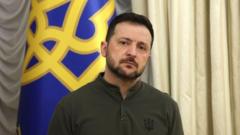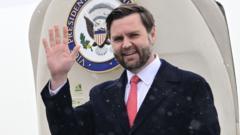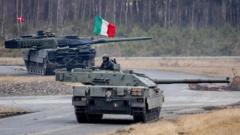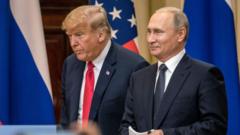President Zelensky faces daunting challenges and a shifting geopolitical landscape following a phone discussion between former President Trump and Russian leader Putin. With calls for robust support from European allies and the looming possibility of alienation in diplomatic negotiations, Zelensky recognizes the critical need for Ukraine's voice in determining its future.
Zelensky Confronts a Transformative Political Shift Following Trump-Putin Dialogue
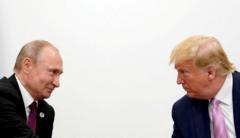
Zelensky Confronts a Transformative Political Shift Following Trump-Putin Dialogue
The recent communication between Trump and Putin injects new complexities into Ukraine's struggle for autonomy as President Zelensky navigates changing Western alliances.
In a significant turn of events for Ukraine, President Volodymyr Zelensky is grappling with a new political reality following a 90-minute phone call between former U.S. President Donald Trump and Russian President Vladimir Putin. The conversation marks an unsettling shift for Zelensky, as he realizes that the geopolitical dynamic surrounding his country is growing more uncertain and potentially perilous.
The implications of this dialogue were quickly felt in Kyiv when Zelensky contemporaneously received a call from Trump, who regarded him somewhat dismissively in the context of any peace negotiations. This notion that Zelensky could be sidelined from discussions over Ukraine's fate underlines the pressing concern that Trump and Putin might strike deals without Ukraine’s active involvement, an outcome Zelensky rejected outright.
As he heads towards the Munich Security Conference, Zelensky aims to rally support from Ukraine's allies while preparing for a critical discussion with Trump’s vice president, JD Vance. The American narrative to Zelensky may center around the sentiment that Ukraine is facing significant setbacks and must confront the realities of its circumstances. Zelensky, however, remains optimistic that with proper backing, Ukraine can overcome these challenges.
Amid these developments, the European Union expresses its commitment to Ukraine's sovereignty, signaling the need for a strong European role in any future negotiations. EU foreign policy chief Kaja Kallas emphasized the necessity of providing substantial security guarantees for Ukraine moving forward. Yet, Zelensky is acutely aware that the United States remains the foremost military power, with capabilities that Europe currently cannot match.
Putin's newfound rapport with Trump contrasts sharply with Biden's previous unwavering stance against the Russian leader, who has been labeled a "brutal tyrant." Trump now portrays a softer diplomatic approach, suggesting there could be a resolution to the ongoing conflict, while simultaneously asserting that Ukraine might need to concede some territory—a position that aligns with Moscow’s demands but fractures Ukraine’s insistence on restoring its territorial integrity.
As Trump’s perspective on negotiations unfolds, he faces an uphill task in bridging the starkly opposing positions of Zelensky and Putin. While Zelensky aims to reclaim Ukraine's lost land and seeks NATO membership, Putin’s terms include maintaining control of occupied territories and demanding Ukraine's neutrality. The realities of these demands showcase both a lack of mutual ground for compromise and the complexities that now define the diplomatic landscape.
Moreover, Trump's advance declarations concerning Ukraine's potential future and NATO membership have drawn critical responses, highlighting the difficulties in achieving any meaningful agreement. With a backdrop of a faltering battlefield performance in Eastern Ukraine, Zelensky finds himself at a crossroads, hinging on Western allies to make weighty decisions that could influence Ukraine's fate moving forward.
This transitional phase underscores a pivotal moment in the ongoing conflict between Ukraine and Russia, leaving Zelensky to navigate through an evolving set of challenges as both a leader and advocate for his nation's autonomy.

